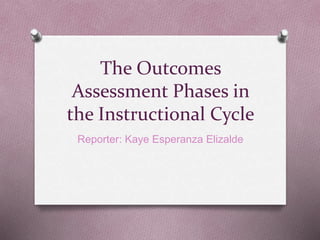
The outcomes assessment phases in the instructional cycle
- 1. The Outcomes Assessment Phases in the Instructional Cycle Reporter: Kaye Esperanza Elizalde
- 3. Assessment O In education, the term assessment refers to the wide variety of methods or tools that educators use to evaluate, measure, and document the academic readiness, learning progress, skill acquisition, or educational needs of students.
- 4. Phase 1: Institutional Mission Institutional mission statements provide various constituencies--students, faculty, legislators, etc.--with the institution's educational goals and guidance concerning the achievement of these goals.
- 5. Example O The DepEd Mission To protect and promote the right of every Filipino to quality, equitable, culture-based, and complete basic education where: O Students learn in a child-friendly, gender-sensitive, safe, and motivating environment. O Teachers facilitate learning and constantly nurture every learner. O Administrators and staff, as stewards of the institution, ensure an enabling and supportive environment for effective learning to happen. O Family, community, and other stakeholders are actively engaged and share responsibility for developing life-long learners.
- 6. Phase 2: Program Goals Program Goals are broad statements of the kinds of learning we hope students will achieve – they describe learning outcomes and concepts (what you want students to learn) in general terms (e.g., clear communication, problem-solving skills, etc.)
- 7. Example GOAL: Students will develop positive cross cultural attitudes. Objectives: O By grades 4-6, students will demonstrate positive cross cultural attitudes as indicated by Agreement with cultural items on the Cross-Cultural Attitude Scale. O This scale ranges from Strongly Disagree to Strongly Agree. See WHAT Data to Collect for various attitude scales.
- 8. Phase 3: Subject Objectives O Subject objectives are brief statements that describe what students will be expected to learn by the end of school year, course, unit, lesson, project, or class period.
- 9. Example This course is designed to prepare you for professional writing experiences. By the end of the course, you should be able to: O Identify the primary and secondary audience(s) of a text. O Craft texts which take into consideration the needs of your primary audience(s). O Write in an array of genres for a variety of purposes. O Identify different rhetorical strategies and appeals in the writing of others. O Use various rhetorical strategies and appeals to make arguments in your own writing. O Appreciate the requirements and limitations placed on different types of writing by their unique rhetorical situations. O Craft texts which consider the requirements and limitations of their unique rhetorical situations.
- 10. Phase 4: Desired Student Learning Outcomes Learning outcomes are statements that describe significant and essential learning that learners have achieved, and can reliably demonstrate at the end of a course or program. In other words, learning outcomes identify what the learner will know and be able to do by the end of a course or program.
- 11. Example O The learner will have demonstrated the ability to make engine repairs on a variety of automobiles. In the above statement, the ability to make engine repairs implies that the person has the requisite knowledge to do so.
- 12. Phase 5: Diagnostic Assessment Diagnostic assessment is a type of assessment which examines what a student knows and can do prior to a learning program being implemented. Assessment of students' skills and knowledge upon entry to the program provides a baseline against which to assess progress.
- 13. Example O Baseline test O Journal O Performance Task O Word Splash
- 14. Phase 6: Deciding on Lesson Focus The first phase of a gradual release of responsibility model is the focus lesson. This is the time when the teacher is demonstrating, modeling, and sharing his or her thinking with students. Although this segment may be brief (5–15 minutes), it is powerful
- 15. Phase 7: Supporting Student Activities O Students apply principles of logical thinking and persuasive argument in writing. 1. Forming opinion about the topic. 2. Researching and writing about a variety of perspectives. 3. Adapting style to identified audience 4. Employing clear argument in writing..
- 16. Phase 8: Formative Assessment Outcomes Formative assessment refers to a wide variety of methods that teachers use to conduct in-process evaluations of student comprehension, learning needs, and academic progress during a lesson, unit, or course
- 17. Example Metacognition Table At the end of class, each student answers the following questions presented to them on index cards: O What did we do in class? O Why did we do it? O What did I learn today? O How can I apply it? O What questions do I have about it?
- 18. Phase 9: Review/Reteach examine or assess (something) formally with the possibility or intention of instituting change if necessary.
- 19. Phase 10: Mastery Learning Mastery learning is a method of instruction where the focus is on the role of feedback in learning. Furthermore, mastery learning refers to a category of instructional methods which establishes a level of performance that all students must “master” before moving on to the next unit (Slavin, 1987).
- 20. Phase 11: Summative Assessment of Outcomes O Summative assessment (or summative evaluation) refers to the assessment of participants where the focus is on the outcome of a program. This contrasts with formative assessment, which summarizes the participants development at a particular time.
- 21. Example O Essay O Report O Portfolio O Dissertation O Presentation
- 22. End of Report Thank you for listening!
